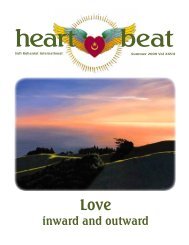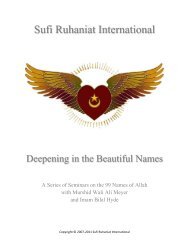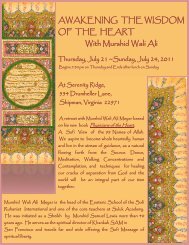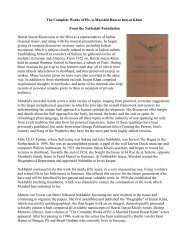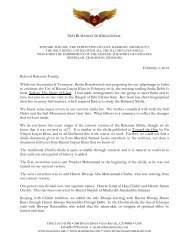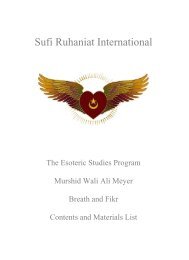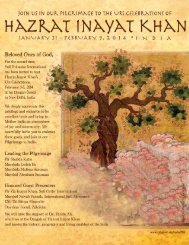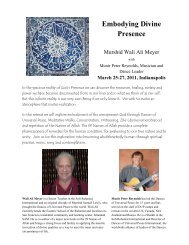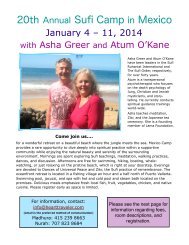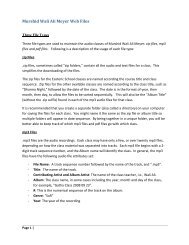HeartBeat Magazine: The Edge of Life - Sufi Ruhaniat International
HeartBeat Magazine: The Edge of Life - Sufi Ruhaniat International
HeartBeat Magazine: The Edge of Life - Sufi Ruhaniat International
Create successful ePaper yourself
Turn your PDF publications into a flip-book with our unique Google optimized e-Paper software.
From the<br />
editor....<br />
I started a new job<br />
this year, working<br />
for Commonweal,<br />
an organization<br />
that—among other<br />
things—helps<br />
people and doctors<br />
work deeply and open-heartedly with death.<br />
Through events at Commonweal, I meet people<br />
who are literally facing their own mortality. It’s<br />
not uncommon to have a conversation with<br />
someone who is in a late stage cancer, whose<br />
eyes tell the story <strong>of</strong> the preciousness <strong>of</strong> every<br />
single moment. Sometimes, in those eyes, I see<br />
love and deep peace; sometimes I see hopelessness<br />
and fear.<br />
We don’t need to be literally facing our mortality<br />
to feel love, peace, hopelessness or fear. It is<br />
all around and within us. Maybe it is because<br />
part <strong>of</strong> us knows that the minute we are born,<br />
we face—as one <strong>of</strong> our contributors this issue,<br />
Dr. Rachel Remen, calls it—the “<strong>Edge</strong> <strong>of</strong> <strong>Life</strong>.”<br />
In permaculture, edges (the boundaries between<br />
elements in ecosystems) are known to be the<br />
most fertile places, filled with activity, life, and<br />
abundance. In this issue, we explore the fertility<br />
and potency that comes from acknowledging<br />
death, in ourselves, our loved ones, and our<br />
world.<br />
Our <strong>Sufi</strong> community is rich with members working<br />
in and around this edge. So much gratitude<br />
and appreciation to Ram Dass, who contributed<br />
a powerful article never before published; to<br />
Dr. Rachel Remen for allowing us to re-publish<br />
material from her national bestseller My Grandfather’s<br />
Blessings: Stories <strong>of</strong> Strength, Refuge, and<br />
Belonging; to Sara Morgan for sharing an “edge<br />
<strong>of</strong> life”experience in her own life; to Bodhi Be<br />
for his Hawaiian perspective on life and death;<br />
to the Ken Botto Trust for the haunting cover image;<br />
and to Commonweal for their rich resources<br />
and insight about the importance <strong>of</strong> encouraging<br />
open dialogue about edge-<strong>of</strong>-life issues. And<br />
gratitude to all <strong>of</strong> you that work with these issues<br />
each day, bringing them into the light.<br />
Many Blessings.<br />
—Kyra Epstein, Editor <br />
Hazrat Inayat Khan<br />
from Aqibat: <strong>Life</strong> After Death<br />
Chapter 1: Death<br />
We love our body and identify ourselves with it to<br />
such an extent that we are very unhappy to think that<br />
this body, which is so dear to us, will some day be in<br />
the grave. No one likes to think that it will die and be<br />
destroyed. But the soul is our true self. It existed before<br />
our birth and will exist after our death. That which<br />
holds the conception <strong>of</strong> ‘I’, a living entity, is not the<br />
body but the soul deluded by the body. <strong>The</strong> soul thinks<br />
that it is the body; it thinks that it walks, sits, lies down<br />
when the body does, but it does not really do any <strong>of</strong><br />
these things. A little indisposition <strong>of</strong> the body makes<br />
it think, ‘I am ill.’ A slight <strong>of</strong>fense makes it dejected. A<br />
little praise makes it think itself in heaven. In reality it<br />
is not in heaven nor on earth; it is where it is. <strong>The</strong> soul’s<br />
dwelling in the material body deludes it so much that<br />
it thinks, ‘I can live only on material food, can stand<br />
only on earth, can enjoy only material surroundings.<br />
Without these I am nowhere, I am nothing.’<br />
<strong>The</strong>re is a Persian saying: ‘Do not build a house on the<br />
ground <strong>of</strong> another.’ This is what the soul does. Whatever<br />
it sees, the consciousness recognizes as itself. Its<br />
purity makes it reflect whatever is before it, and then<br />
it thinks, ‘This is I’, just as clear water reflects our image.<br />
<strong>The</strong> soul then wants everything to be very nice<br />
and pleasant for its comfort and vanity. It wants to<br />
see its objective self well dressed; then it wants very<br />
good things about it. It sets up a good house, and all<br />
through this life it is in pursuit <strong>of</strong> these things. <strong>The</strong>n<br />
when death comes this building raised on the sand is<br />
blown away. Its collected property is taken from it. This<br />
is a very, very great disappointment. It loses all that it<br />
took interest in. Its withdrawing into its pure self, and<br />
the scattering <strong>of</strong> all earth’s deluding environment from<br />
its sight impresses it<br />
with the idea <strong>of</strong> death,<br />
to its greatest horror.<br />
This horror and disappointment<br />
are the only<br />
death there is, for the<br />
body is nothing but a<br />
covering put over our<br />
soul, and when it is<br />
gone we are not dead;<br />
just as we do not think<br />
that we are dead when<br />
our coat is worn out, or<br />
if someone tears our<br />
shirt. <br />
Pir-o-Murshid Hazrat Inayat Khan<br />
4 <strong>HeartBeat</strong> Winter 2011



